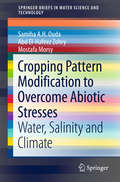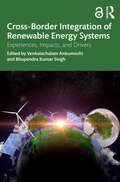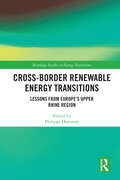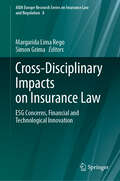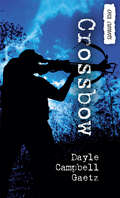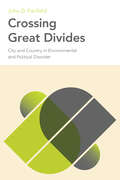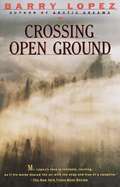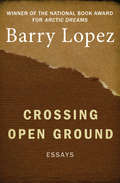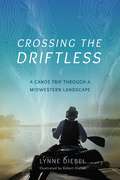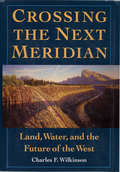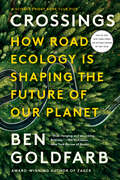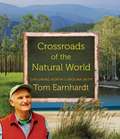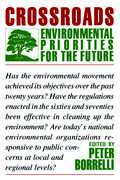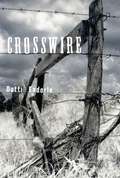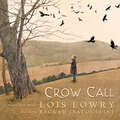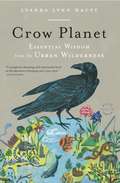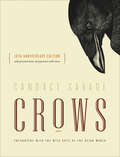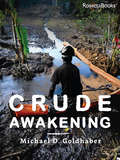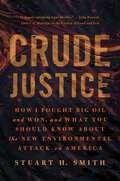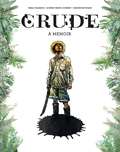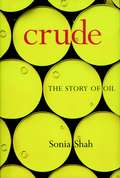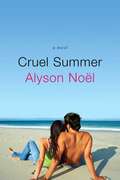- Table View
- List View
Cropping Pattern Modification to Overcome Abiotic Stresses: Water, Salinity and Climate (SpringerBriefs in Water Science and Technology)
by Abd El-Hafeez Zohry Samiha A. H. Ouda Mostafa MorsyThis book provides state-of-the art analysis, never done before in Egypt, on agro-climatic zones level. This study deals with how the national cropping pattern can be modified to overcome abiotic stresses, such as water scarcity, induced salinity and climate change to reduce their negative effects on food production. To this end, different cropping patterns are suggested. This study can be a framework for other developing countries to be used in quantifying and filling the gap in their knowledge about practices that can help in increasing their food security through increasing food production. Furthermore, the study is useful for policy makers to help them in their future plans and policies.
Cross-Border Integration of Renewable Energy Systems: Experiences, Impacts, and Drivers
by Venkatachalam Anbumozhi and Bhupendra Kumar SinghCross-border energy trade and integration of renewable energy have become significant for countries and regions to meet demands, minimize costs, and foster socio-economic and climate stability in the dynamic and unstable energy market. This book explores different models of global energy trade between regions and their benefits and challenges with a special focus on India’s Northeast region. Countries in South and Southeast Asia are endowed with abundant renewable energy resources. This book examines the energy mix of the countries such as India, Myanmar, Thailand, Bangladesh, and Bhutan among others and their efforts to achieve more integrated markets and renewable energy integration in the region. It highlights the potential of Northeast India given its rich natural resources and strategic location to harness the potential cross-border energy trade with ASEAN countries. The volume provides analytical perspectives on drivers, constraints, opportunities and barriers, as well as measures that countries could take to address institutional, financial, policy, and governance issues to minimize the total costs of energy security and maximize the social-economic benefits for people in these regions. It identifies the necessary conditions – grid flexibility, policy, market, and regulatory solutions for clean energy trade – and contributes to growth of low-carbon development as well as policy making by focusing on renewable energy integration across borders. This volume will be of interest to students and researchers of energy and climate studies, environmental politics, trade, and economics and international relations. This book is freely available as a downloadable Open Access PDF at www.taylorfrancis.com under a Creative Commons (CC-BY-NC-ND) 4.0 license.
Cross-Border Renewable Energy Transitions: Lessons from Europe's Upper Rhine Region (Routledge Studies in Energy Transitions)
by Philippe HammanThis book explores the intrinsically multiscale issue of renewable energy transition from a local, national and transnational perspective, and provides insights into current developments in the Upper Rhine Region that can serve as an international model. Organised around the exploration of stakeholder issues, the volume first describes a framework for public action and modelling and then articulates a triple complementary focus from the viewpoint of law, economics and sociology. This multidisciplinary approach is anchored in the social sciences, but also explores the ways in which technological issues are increasingly debated in the implementation of the ecological transition. With a focus on the Upper Rhine Region of France, Germany and Switzerland, the contributions throughout analyse how concrete regional projects emerge, and whether they are carried out by local authorities, private energy groups, network associations or committed citizens. From this, it appears that real-world energy transition modes can be best understood as permanent transactional processes involving institutional regulations, economic levers and barriers and social interactions. This book will be of interest to advanced students and scholars focusing on renewable energy transition, stakeholder issues, environment and sustainability studies, as well as those who are interested in the methodological aspects of the social sciences, especially within the fields of sociology, law, economy, geography, political science, urbanism and planning.
Cross-Disciplinary Impacts on Insurance Law: ESG Concerns, Financial and Technological Innovation (AIDA Europe Research Series on Insurance Law and Regulation #8)
by Simon Grima Margarida Lima RegoThis book explores the insurance sector’s potential role, influence, and impact on society in light of new environmental, social, and governance (ESG) concerns. Furthermore, it looks into how financial and technological innovations help reshape insurance regulation and business models. Unlike their predecessors, 21st century insurers have a growing impact on cross-sector service provision by making available to their clients a wealth of expert knowledge and experience in data analytics. The book delves into insurers’ transition from suppliers of products – consisting of risk coverage or investment opportunities – to providers of various services, and ultimately to solution providers by partnering with their clients so as to prevent failure, optimize their clients’ operations and help them excel in their economic sector. Insurance regulations and policies can be affected by various factors, such as changes in the economy, technological advances, and shifting consumer preferences, to name a few. Additionally, the insurance industry can have a significant bearing on the wider economy, making it important for the industry to operate within a framework of comprehensive regulations.This book includes a diverse set of theoretical, empirical, and policy-oriented chapters on particular aspects of new trends and wider analyses leading to a more systematic understanding of the industry’s socio-economic role. It offers a mixture of chapters from insurance academics and professionals from different countries, cultures, and scientific backgrounds. The methodologies used are diverse, including legal, sociological, historical, economic and financial as well as interdisciplinary analyses. The book has a global scope, including chapters of a more global nature and others addressing particular jurisdictions on different continents, including Europe, Asia and North America.
Crossbow (Orca Currents)
by Dayle Campbell GaetzFourteen-year-old Matt has only one goal in life: to become a hermit. He has no use for school, but he loves the solitude of the forest. When he hikes up to the cabin he built for himself, he discovers a mysterious stranger named Forrest has moved in. At first, Matt doesn't connect Forrest's appearance with the rash of local robberies. Forrest seems to be the perfect hermit, and he teaches Matt the skills he needs to achieve his goal, including how to hunt with a crossbow. But when Forrest tries to kill an endangered Roosevelt elk, Matt questions the ethics of his new friend. When Matt discovers a stolen rifle in his cabin, he finds himself trapped in a dangerous situation. This short novel is a high-interest, low-reading level book for middle-grade readers who are building reading skills, want a quick read or say they don’t like to read!
Crossing Great Divides: City and Country in Environmental and Political Disorder (Urban Life, Landscape and Policy)
by John D. FairfieldRanging across two centuries of American history, Crossing Great Divides argues that the habit of construing city and country as opposites is at the root of our current environmental and political disorder. This oversimplifying dualism has distorted how we planned cities, our patterns of production and consumption, how we deal with waste, and how urban and rural populations perceive each other. Conventional urban environmental reform has made modern city life possible, but it has done little to limit the despoliation of distant places. Nevertheless, the successes of urban environmental reform remind us of what is possible. John Fairfield concludes with a case study of Phoenix, Arizona to demonstrate this dysfunctional relationship between city and country while developing a sympathetic critique of the Green New Deal. He suggests how we might bridge the “great divide” as we face the daunting challenges the twenty-first century is pressing upon us.
Crossing Open Ground
by Barry LopezThe author travels through the American Southwest and Alaska, discussing endangered wildlife and forgotten cultures.
Crossing Open Ground
by Barry LopezNational Book Award–winning author Barry Lopez explores the challenges and joys of the human experience through the frame of the natural world in fourteen arresting and extraordinary essaysIn Crossing Open Ground, award-winning literary writer Barry Lopez offers prescient, beautiful, and thought-provoking reflections on how the natural world can define and illuminate our sense of self. Whether he&’s traversing the Arctic tundra or the deserts of the American Southwest, recalling the devastating beaching of forty-one sperm whales along the Oregon coast or reveling in the remarkable migrations of wild geese, Lopez shows readers the world&’s special places, its remarkable people, and stunning natural events. He thoughtfully explores humankind&’s place in this vast natural scheme, and opens our eyes to its breathtaking complexity. This ebook features an illustrated biography of Barry Lopez including rare images and never-before-seen documents from the author&’s personal collection.
Crossing Open Ground
by Barry LopezNational Book Award–winning author Barry Lopez explores the challenges and joys of the human experience through the frame of the natural world in fourteen arresting and extraordinary essaysIn Crossing Open Ground, award-winning literary writer Barry Lopez offers prescient, beautiful, and thought-provoking reflections on how the natural world can define and illuminate our sense of self. Whether he&’s traversing the Arctic tundra or the deserts of the American Southwest, recalling the devastating beaching of forty-one sperm whales along the Oregon coast or reveling in the remarkable migrations of wild geese, Lopez shows readers the world&’s special places, its remarkable people, and stunning natural events. He thoughtfully explores humankind&’s place in this vast natural scheme, and opens our eyes to its breathtaking complexity. This ebook features an illustrated biography of Barry Lopez including rare images and never-before-seen documents from the author&’s personal collection.
Crossing the Driftless
by Lynne DiebelThe Driftless Area is the land the glaciers missed, an ancient landscape of bluffs, ridgetops, and steep valleys that long ago was a seabed. Covering much of southwestern Wisconsin, its contours were deeply carved from bedrock, not by ice but by many rivers. Crossing the Driftless is both a traveler's tale and an exploration of this dramatic environment, following the streams of geologic and human history. Lynne Diebel and her husband, Bob, crossed the Driftless Area by canoe, journeying 359 river miles (and six Mississippi River locks and five portages) from Faribault, Minnesota, where her family has a summer home on Cedar Lake, to their Wisconsin home in Stoughton, one block from the Yahara River. Traveling by river and portage, they paddled downstream on the Cannon and Mississippi rivers and upstream on the Wisconsin River, in the tradition of voyageurs. Lynne tells the story of their trip, but also the stories of the rivers they canoed and the many tributaries whose confluences they passed.
Crossing the Next Meridian: Land, Water, and the Future of the West
by Charles F. WilkinsonIn Crossing the Next Meridian, Charles F. Wilkinson, an expert on federal public lands, Native American issues, and the West's arcane water laws explains some of the core problems facing the American West now and in the years to come. He examines the outmoded ideas that pervade land use and resource allocation and argues that significant reform of Western law is needed to combat desertification and environmental decline, and to heal splintered communities. Interweaving legal history with examples of present-day consequences of the laws, both intended and unintended, Wilkinson traces the origins and development of the laws and regulations that govern mining, ranching, forestry, and water use. He relates stories of Westerners who face these issues on a day-to-day basis, and discusses what can and should be done to bring government policies in line with the reality of twentieth-century American life.
Crossings: How Road Ecology Is Shaping the Future of Our Planet
by Ben GoldfarbWinner of the Rachel Carson Award for Excellence in Environmental Journalism Finalist for the NYPL Helen Bernstein Book Award for Excellence in Journalism Finalist for the Reading the West Book Award in Nonfiction Finalist for the Colorado Book Award Named a Best Book of the Year by the New York Times, The New Yorker, Science News, Smithsonian Magazine, and Kirkus Reviews "A powerhouse of a book…comprehensive and engaging." —David Gessner, Washington Post An eye-opening account of the global ecological transformations wrought by roads, from the award-winning author of Eager. Some 40 million miles of roadways encircle the earth, yet we tend to regard them only as infrastructure for human convenience. While roads are so ubiquitous they’re practically invisible to us, wild animals experience them as entirely alien forces of death and disruption. In Crossings, environmental journalist Ben Goldfarb travels throughout the United States and around the world to investigate how roads have transformed our planet. A million animals are killed by cars each day in the U.S. alone, but as the new science of road ecology shows, the harms of highways extend far beyond roadkill. Creatures from antelope to salmon are losing their ability to migrate in search of food and mates; invasive plants hitch rides in tire treads; road salt contaminates lakes and rivers; and the very noise of traffic chases songbirds from vast swaths of habitat. Yet road ecologists are also seeking to blunt the destruction through innovative solutions. Goldfarb meets with conservationists building bridges for California’s mountain lions and tunnels for English toads, engineers deconstructing the labyrinth of logging roads that web national forests, animal rehabbers caring for Tasmania’s car-orphaned wallabies, and community organizers working to undo the havoc highways have wreaked upon American cities. Today, as our planet’s road network continues to grow exponentially, the science of road ecology has become increasingly vital. Written with passion and curiosity, Crossings is a sweeping, spirited, and timely investigation into how humans have altered the natural world—and how we can create a better future for all living beings.
Crossroads of the Natural World
by Tom EarnhardtIn this richly illustrated love letter to the wild places and natural wonders of North Carolina, Tom Earnhardt, writer and host of UNC-TV's Exploring North Carolina and lifelong conservationist, seamlessly ties deep geological time and forgotten species from our distant past to the unparalleled biodiversity of today. With varied topography and a climate that is simultaneously subtropical, temperate, and subarctic, he shows that North Carolina is a meeting place for living things more commonly found far to the north and south. Highlighting the ways in which the state is a unique ecological crossroads, Earnhardt's research, insightful writing, and stunning photography will both teach and inspire. Crossroads of the Natural World invites readers to engage a variety of topics, including the impacts of invasive species, the importance of forested buffers along our rivers, the role of naturalists, and the challenges facing the state in a time of climate change and sea-level rise. By sharing his own journey of more than sixty years, Earnhardt entices North Carolinians of every age to explore the natural diversity of our state.
Crossroads: Environmental Priorities For The Future
by James Gustave Speth Barry Commoner Robert Boyle Cynthia Wilson Richard S. Booth Amos EnoThe environmental movement today is at a critical crossroads. Crossroads: Environmental Priorities for the Future is an in-depth assessment of the movement's successes and failures, and also offers prescriptions for the future. It includes contributions from some of the country's top environmental leaders and activists, including Barry Commoner, Stewart Udall, William K. Reilly, Gus Speth, Jay Hair, Lois Gibbs, Michael Frome, Chuck Little, and William Futrell.
Crosswire
by Dotti EnderleWhen an 1883 drought drives free-range cattlemen to shred Texas ranchers' barbed wire fences and steal water, thirteen-year-old Jesse works hard to help while dealing with his father and brothers falling-out and his own fear of guns.
Crow Call (Junior Great Books Series 3)
by Lois LowryThe two-time Newbery medalist has crafted “a loving representation of a relationship between parent and child” in post-WWII America (Publishers Weekly, starred review).This is the story of young Liz, her father, and their strained relationship. Dad has been away at WWII for longer than she can remember, and they begin their journey of reconnection through a hunting shirt, cherry pie, tender conversation, and the crow call. This allegorical story shows how, like the birds gathering above, the relationship between the girl and her father is graced with the chance to fly.“The memory of a treasured day spent with a special person will resonate with readers everywhere.” —School Library Journal (starred review)“Beautifully written, the piece reads much like a traditional short story . . . the details of [Ibatoulline’s] renderings gracefully capture a moment in time that was lost. Relevant for families whose parents are returning from war, the text is also ripe for classroom discussion and for advanced readers.” —Kirkus Reviews
Crow Planet: Essential Wisdom from the Urban Wilderness
by Lyanda Lynn HauptThere are more crows now than ever. Their abundance is both an indicator of ecological imbalance and a generous opportunity to connect with the animal world. CROW PLANET reminds us that we do not need to head to faraway places to encounter "nature." Rather, even in the suburbs and cities where we live we are surrounded by wild life such as crows, and through observing them we can enhance our appreciation of the world's natural order. CROW PLANET richly weaves Haupt's own "crow stories" as well as scientific and scholarly research and the history and mythology of crows, culminating in a book that is sure to make readers see the world around them in a very different way.
Crowded Planet: How humans came to rule the world (and how you can lessen our impact)
by Anna ClaybourneA powerful look at Earth's population crisis, written by award-winning children's author Anna ClaybourneThere are over 8 billion human beings living on Earth. That's a LOT of people! And the world's population is still growing, which leads to a big question ... are there too many of us? The human population has been rising since ancient times, but it has zoomed up especially fast over the last 100 years or so. While humans have been on Earth, we've made huge changes to the planet. We've built cities and roads and taken over wild areas, affecting the other living things we share our world with. We've polluted our skies, land and seas and are fast using up Earth's precious natural resources. How can we lessen our impact on Earth, before it's too late?ContentsA world full of people/The rise of humans/Population explosion/CASE STUDY: Crowded Tokyo/Taking over the world/Food and water/Population and health/Harming wildlife/CASE STUDY: Palm oil plantations/Country populations/Moving around/How many children?/CASE STUDY: Girls' education in Kenya/Population pyramids/Ageing populations/Falling populations/CASE STUDY: Plummeting population in Puerto Rico/Up or down?/What can you do?/Into the futureTitles in this series:Plastic PlanetHot PlanetPandemic PlanetRecycled PlanetSustainable PlanetExtinction PlanetPeaceful Planet?Unequal PlanetWatery Planet
Crows: Encounters with the Wise Guys of the Avian World
by Candace SavageA treasure trove of stories, poems, and information on the brainy, black-feathered bird that&’s rich in insight and humor. This revised and expanded edition of Candace Savage&’s best-selling book about ravens and crows is enhanced by additional paintings, drawings, and photos, as well as a fascinating selection of first-person stories and poems about remarkable encounters with crows. In one story, a pack of crows brilliantly thwarts an attack by a Golden Eagle; in another, a mischievous crow rescues the author from grief. And in a third piece, after nursing a battered baby crow back to health until it flies off with other crows, Louise Erdrich hauntingly describes her altered awareness as she listens for the &“dark laugh&” of crows while she works. Based on two decades of audacious research by scientists around the world, the book also provides an unprecedented, evidence-based glimpse into corvids&’ intellectual, social, and emotional lives. But whether viewed through the lens of science, myth, or everyday experience, the result is always the same. These birds are so smart—and so mysterious—they take your breath away.Published in Partnership with the David Suzuki Institute.Praise for Crows &“A beautifully crafted celebration of these birds.&” —Nature &“A deft juxtaposition of interesting anecdotes and firsthand accounts of scientific discoveries.&” —Canadian Literature &“Surprising avian revelations are contained within the pages of Savage&’s glorious festival of crow arcana.&” —Alberta Views
Crude Awakening
by Michael D. Goldhaber&“A rip-roaring new ebook that chronicles the saga of the two [Chevron] trials . . . Shocking, appalling and hugely entertaining.&”—Financial Times A behind-the-scenes look at the world&’s biggest and most tangled legal case. On their way to winning a $19 billion verdict against Chevron in Ecuador, lawyers for the Amazonian plaintiffs invited a documentary film crew to record their every move. Unfortunately, their every move included fraud. Chevron subpoenas the outtakes and follows the clues from one improbable fraud to another. The drama culminates in a racketeering counter-trial, where it&’s the testimony of one corrupt ex-judge against another. A detective story and courtroom drama, with an epilogue of keen commentary, Crude Awakening is the definitive account of Chevron&’s struggle to prove that the truth is the truth—even when the truth is on the side of the big bad oil company, and not on the side of the charismatic little guy fighting for the indigenous people of the Amazon rain forest. Crude Awakening will captivate both students of law and students of human nature. &“A superb feat of legal journalism.&”—Forbes
Crude Justice: How I Fought Big Oil and Won, and What You Should Know About the New Environmental Attack on America
by Stuart H. SmithOne day in the small Mississippi town of Laurel, a 26-year-old expectant mom named Karen Street sat down at the edge of her bathtub—and felt her hip split in two. The episode was so bizarre it wasn't until later, after she saw the doctor, that she realized her bone disease was almost certainly linked to her father-in-law's business. Winston Street ran a machine shop that drilled the gunk out of pipes used by Chevron, Shell and other giants of the oil industry—creating a white powder that covered Karen Street's husband's overalls every night, which then landed in their vegetable garden...and was highly radioactive. Winston Street didn't know the dust was poisonous, nor did his workers or his family. But someone did know. Indeed, there was evidence that America's Big Oil companies were aware for decades that they were pulling up radium from under the earth, poisoning yards like Street's while dumping radioactive water in unlined pits across the South. Now, to prove that and win justice for his blue-collar clients, an untested young lawyer named Stuart H. Smith and his eccentric team would have to get the better of America's best-known radiation attorney and the global clout of Chevron inside a Mississippi courtroom. In a gripping tale that reads as if torn from the pages of a John Grisham novel, Crude Justice tells how the Little Guy can take on the behemoth of Big Oil and win…with the help of a good attorney. Recounting more than two decades as a top environmental lawyer in the toxic oil patch of the American South, Smith tells the story of how he upped the ante again and again—getting the best of Chevron, then taking on the world's most powerful corporation, ExxonMobil, with $1 billion on the line, and finally ferreting out the elusive truth behind BP's 2010 Deepwater Horizon disaster, the worst oil spill in U.S. history. Smith finally builds upon the courtroom drama of his past and the environmental threats of the present—from fracking to the Keystone XL pipeline—to issue a resounding call for America to break its crippling addiction to fossil fuels.
Crude: A Memoir
by Pablo Fajardo Sophie Tardy-JoubertOil waste was everywhere—on the roads, in the rivers where they fished, and in the water that they used for bathing, cooking, and washing. Children became sick and died, cases of stomach cancer skyrocketed, and women miscarried or gave birth to children with congenital disorders. The American oil company Texaco—now part of Chevron—extracted its first barrel of crude oil from Amazonian Ecuador in 1972. It left behind millions of gallons of spilled oil and more than eighteen million gallons of toxic waste. In Crude, Ecuadorian lawyer and activist Pablo Fajardo gives a firsthand account of Texaco’s involvement in the Amazon as well as the ensuing legal battles between the oil company, the Ecuadorian government, and the region’s inhabitants. As a teenager, Fajardo worked in the Amazonian oil fields, where he witnessed the consequences of Texaco/Chevron’s indifference to the environment and to the inhabitants of the Amazon. Fajardo mobilized with his peers to seek reparations and in time became the lead counsel for UDAPT (Union of People Affected by Texaco), a group of more than thirty thousand small farmers and indigenous people from the northern Ecuadorian Amazon who continue to fight for reparations and remediation to this day.Eye-opening and galvanizing, Crude brings to light one of the least well-known but most important cases of environmental and racial injustice of our time.
Crude: A Memoir
by Pablo Fajardo Sophie Tardy-JoubertOil waste was everywhere—on the roads, in the rivers where they fished, and in the water that they used for bathing, cooking, and washing. Children became sick and died, cases of stomach cancer skyrocketed, and women miscarried or gave birth to children with congenital disorders. The American oil company Texaco—now part of Chevron—extracted its first barrel of crude oil from Amazonian Ecuador in 1972. It left behind millions of gallons of spilled oil and more than eighteen million gallons of toxic waste. In Crude, Ecuadorian lawyer and activist Pablo Fajardo gives a firsthand account of Texaco’s involvement in the Amazon as well as the ensuing legal battles between the oil company, the Ecuadorian government, and the region’s inhabitants. As a teenager, Fajardo worked in the Amazonian oil fields, where he witnessed the consequences of Texaco/Chevron’s indifference to the environment and to the inhabitants of the Amazon. Fajardo mobilized with his peers to seek reparations and in time became the lead counsel for UDAPT (Union of People Affected by Texaco), a group of more than thirty thousand small farmers and indigenous people from the northern Ecuadorian Amazon who continue to fight for reparations and remediation to this day.Eye-opening and galvanizing, Crude brings to light one of the least well-known but most important cases of environmental and racial injustice of our time.
Crude: The Story of Oil
by Sonia ShahCrude is the unexpurgated story of oil, from the circumstances of its birth millions of years ago to the spectacle of its rise as the indispensable ingredient of modern life. In addition to fueling our SUVs and illuminating our cities, crude oil and its byproducts fertilize our produce, pave our roads, and make plastic possible. "Newborn babies," observes author Sonia Shah, "slide from their mothers into petro-plastic-gloved hands, are swaddled in petro-polyester blankets, and are hurried off to be warmed by oil-burning heaters." The modern world is drenched in oil; Crude tells how it came to be. A great human drama emerges, of discovery and innovation, risk, the promise of riches, and the power of greed.Shah infuses recent twists in the story with equal drama, through chronicles of colorful modern-day characters -- from the hundreds of Nigerian women who stormed a Chevron plant to a monomaniacal scientist for whom life is the pursuit of this earthblood and its elusive secret. Shah moves masterfully between scientific, economic, political, and social analysis, capturing the many sides of the indispensable mineral that we someday may have to find a way to live without.
Cruel Summer
by Alyson NoëlThis was supposed to be my best summer yet, the one I've been working toward since practically forever. Now I'm being banished from everything I know and love, and it just doesn't make any sense.
